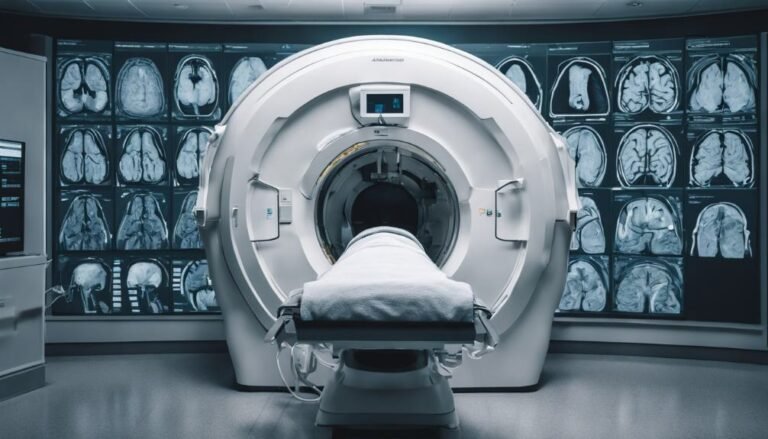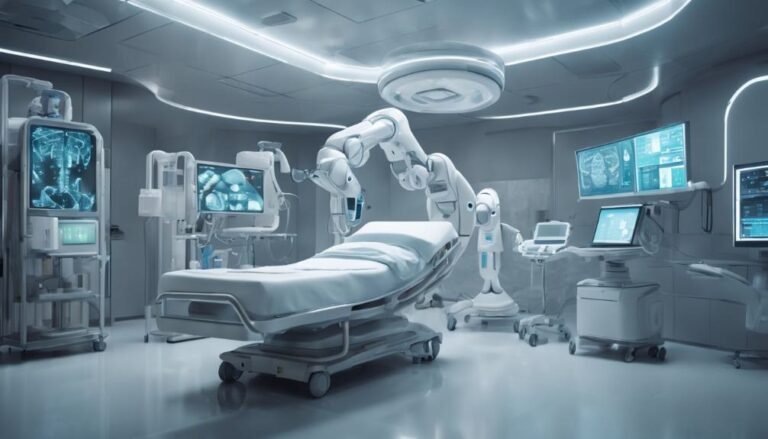AI in Patient Simulation
Imagine a world where the boundaries between virtual and real patient care blur, where AI seamlessly integrates into medical training to elevate your skills beyond traditional methods. The synergy between artificial intelligence and patient simulation holds immense potential in revolutionizing healthcare education and practice. As you explore the intricate ways AI enhances clinical learning experiences, you will uncover the transformative impact it has on shaping competent healthcare professionals. Stay tuned to unravel the full scope of AI's influence on patient simulation and the future of healthcare training.
Key Takeaways
- Real-time feedback enhances learning in patient simulation.
- AI algorithms tailor personalized scenarios for trainees.
- Improved medical decision-making through AI-driven diagnostics.
- AI objectively evaluates trainees' skills in simulation.
- Personalized training with adaptive AI algorithms.
Enhancing Learning Through AI
AI enhances learning in patient simulation by providing real-time feedback and personalized scenarios tailored to individual learner needs. Through the use of sophisticated AI algorithms, interactive learning experiences are created that adapt to the user's actions, responses, and decision-making processes. These AI algorithms analyze the learner's interactions within the simulation, identifying strengths and areas needing improvement.
By incorporating AI into patient simulation, learners are able to practice in a dynamic environment that mimics real-life patient care situations. The AI can simulate a wide range of medical scenarios, from routine check-ups to complex emergency situations, allowing learners to develop their clinical skills in a controlled yet realistic setting.
Real-time feedback provided by the AI system guides learners on best practices, correct procedures, and areas for growth.
Realistic Scenarios and AI Integration
You can enhance patient interactions through AI by creating dynamic scenarios that adjust in real-time based on user input and behavior.
This integration allows for a more realistic simulation experience, mimicking the unpredictability of actual patient encounters.
Ai-Enhanced Patient Interactions
Utilizing advanced AI algorithms, realistic patient scenarios are seamlessly integrated into simulation training programs, enhancing the authenticity and effectiveness of healthcare provider interactions.
AI-enhanced patient interactions provide a dynamic platform for learners to engage in realistic medical situations, where AI algorithms drive patient responses based on the actions and decisions of the healthcare provider. This interactive feedback loop allows for tailored learning experiences, where responses are shaped by the individual's choices, promoting critical thinking and decision-making skills.
Ethical considerations play an important role in designing AI interactions within patient simulation scenarios. Developers must make sure that AI responses align with ethical standards and guidelines, maintaining patient confidentiality and dignity throughout the simulation process.
Patient feedback mechanisms integrated into AI interactions provide valuable insights for learners, offering constructive criticism and performance evaluations that enhance learning outcomes.
Dynamic Scenario Adjustments
How can realistic scenarios be dynamically adjusted through the integration of AI technology in patient simulation training programs?
Scenario customization in patient simulation involves tailoring scenarios to meet specific learning objectives. AI feedback plays an essential role in providing learners with real-time insights and performance evaluations.
By leveraging adaptive learning algorithms, AI can analyze learner interactions and adjust scenarios on-the-fly based on individual progress. This dynamic approach guarantees that learners are constantly challenged at an appropriate level, fostering engagement and knowledge retention.
Through AI integration, patient simulation programs can offer a personalized learning experience that adapts to each learner's needs. Real-time adjustments driven by AI help simulate diverse patient conditions and responses, enhancing the realism of scenarios.
Improved Medical Decision-Making
You can leverage AI in patient simulation to enhance diagnostic accuracy by utilizing algorithms that analyze vast amounts of patient data rapidly.
This technology streamlines treatment processes by providing real-time insights and recommendations based on the most up-to-date medical research and guidelines.
Enhancing Diagnostic Accuracy
Can artificial intelligence revolutionize medical decision-making by greatly enhancing diagnostic accuracy in patient simulation scenarios?
AI-driven diagnostics have shown promising results in improving diagnostic accuracy and ultimately impacting patient outcomes in a positive manner. Through the implementation of AI algorithms, healthcare providers can leverage vast amounts of patient data to assist in making more precise and timely diagnoses.
By utilizing AI tools within patient simulation environments, medical professionals can benefit from the ability to analyze complex data patterns swiftly and accurately. These AI-driven diagnostics can help identify subtle indicators that may be overlooked by human practitioners, leading to more precise diagnostic conclusions.
This improved accuracy can directly translate into better treatment decisions and outcomes for patients undergoing simulation-based medical training.
The integration of AI into patient simulation scenarios has the potential to greatly enhance diagnostic accuracy, thereby improving medical decision-making processes and ultimately positively influencing patient outcomes. As AI continues to advance, its role in patient simulations is likely to become even more critical in fostering better healthcare practices.
Streamlining Treatment Processes
Incorporating artificial intelligence into patient simulation environments can optimize treatment processes by enhancing medical decision-making through streamlined and efficient analysis of complex data patterns. AI algorithms can rapidly process vast amounts of patient data, identifying trends and correlations that may not be immediately apparent to human clinicians. By integrating AI technology into treatment processes, healthcare providers can make more informed decisions, leading to improved patient outcomes.
Through technology integration, AI can assist in developing personalized treatment plans based on individual patient characteristics, medical history, and real-time data inputs. This tailored approach can enhance the effectiveness of treatments, reduce errors, and ultimately improve patient recovery rates. AI algorithms can also analyze treatment responses and adjust protocols in real-time, ensuring that patients receive the most suitable care at every stage of their medical journey.
Personalized Training With AI
Utilizing artificial intelligence (AI) allows for the implementation of personalized training in patient simulation, enhancing the individual learning experience. Adaptive algorithms play an important role in tailoring simulation scenarios to meet the specific needs and skill levels of each trainee. These algorithms adjust the difficulty and complexity of the scenarios in real-time based on the trainee's performance, ensuring an ideal learning curve.
Personalized feedback provided by AI systems is another key component of enhancing training in patient simulation. Through advanced data analysis, AI can offer immediate and targeted feedback to trainees, highlighting areas for improvement and reinforcing successful actions.
This personalized feedback mechanism fosters a more engaging and effective learning environment, allowing trainees to track their progress and focus on refining their skills.
AI's Role in Skill Assessment
Artificial intelligence plays a crucial role in objectively evaluating and appraising the skills of trainees in patient simulation scenarios. Performance evaluation in healthcare simulation has seen significant advancements through the integration of AI algorithms. AI is instrumental in providing detailed and precise assessments of trainees' performance while interacting with virtual patients.
Skill assessment using AI algorithms allows for a more objective and standardized evaluation process. The technology can analyze a wide range of factors, including decision-making, communication skills, and clinical reasoning, providing valuable feedback to enhance the proficiency of trainees. By simulating realistic patient scenarios, AI-driven skill assessments offer a safe environment for trainees to practice and improve their clinical skills.
Moreover, AI algorithms can adapt to individual learning curves, providing personalized feedback and guidance based on the trainee's performance. This tailored approach enhances the effectiveness of training programs and ensures that each individual receives targeted support to address their specific areas of improvement.
To summarize, AI's role in skill assessment revolutionizes the way healthcare professionals are trained and evaluated in patient simulation scenarios.
Future of AI in Healthcare Simulation
The evolving landscape of healthcare simulation is poised to witness a paradigm shift with the advancements expected in AI technology. AI-driven diagnosis is set to revolutionize the way healthcare simulation is conducted. By integrating artificial intelligence algorithms into simulation scenarios, healthcare professionals will have access to virtual patient simulations that accurately mimic real-life medical conditions. These simulations will provide an immersive environment for training, allowing practitioners to hone their diagnostic skills in a risk-free setting.
Virtual patient simulations powered by AI will offer personalized learning experiences tailored to the individual needs of healthcare professionals. These simulations can adapt in real-time based on the user's actions, providing immediate feedback and guidance.
With AI technology constantly evolving, the future of healthcare simulation holds the promise of more realistic and interactive training environments. The integration of AI-driven diagnosis and virtual patient simulations signifies a significant leap towards enhancing the quality of healthcare education and improving patient outcomes through better-trained medical professionals.
Conclusion
You've just scratched the surface of what AI in patient simulation can offer. Imagine a world where healthcare professionals can train in a virtual environment that adapts to their individual needs, providing real-time feedback and assessment.
This technology isn't just a tool for learning, but a powerful ally in improving patient outcomes. Embrace the future of healthcare education with AI-driven simulations and witness the transformation of clinical skills like never before.







